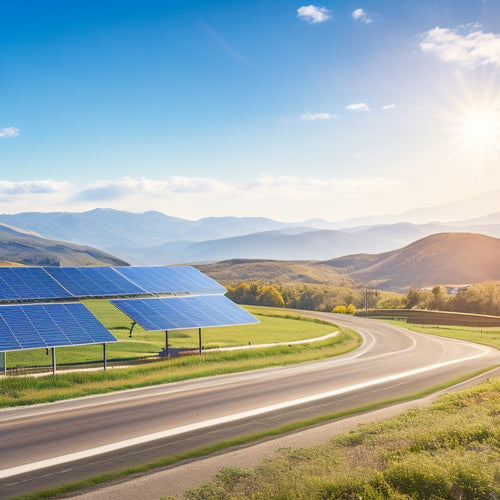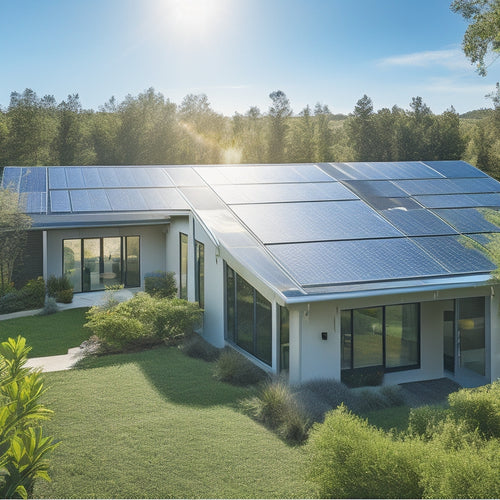
Solar Panel Options for Homes
Share
You're contemplating installing solar panels on your home, and for good reason: with the ability to reduce your energy costs, enhance your property's value, and minimize your carbon footprint, solar panels can be a smart investment for homeowners looking to save money and go green. You can expect to save up to 50% on your utility bills and increase your home's resale value by up to $15,000. Efficient energy conversion rates are vital for maximizing energy output, and you'll want to take into account factors like roof size and orientation when planning your installation. Now, investigate the specifics of how solar panels can benefit your home.
The Essentials
- Installing solar panels can save homeowners up to 50% on their utility bills and increase their monthly cash flow.
- Solar panels can boost a home's resale value by up to $15,000 and provide a federal tax credit of up to 26% of installation costs.
- High-efficiency solar panels with conversion rates above 20% are crucial for maximizing energy output and providing long-term financial benefits.
- Roof size, orientation, and structural integrity are essential considerations for determining solar panel installation feasibility and energy generation potential.
- Solar panels guarantee a low carbon footprint, reducing reliance on fossil fuels and carbon emissions, and can last up to 30 years with minimal maintenance.
Save Money on Bills
By installing solar panels, you'll lower your monthly expenses by reducing your reliance on the grid and generating free energy.
You'll also reduce energy costs by offsetting your consumption with the clean power your solar panels produce.
Additionally, with Renewable Energy Solutions, you can take control of your energy needs and break free from the grid, leading to significant cost savings.
This means you'll save money on your utility bills, putting more cash back in your pocket each month.
Lower Monthly Expenses
With the rising cost of electricity, homeowners are constantly seeking ways to reduce their monthly expenses. You're no exception, and installing solar panels can be an important step towards energy independence.
By utilizing the power of the sun, you can generate your own electricity and reduce your reliance on the grid. This means you'll be paying less to your utility company each month.
With renewable energy systems sustainable energy solutions, you can enjoy increased energy independence and notably lower your carbon footprint.
By installing solar panels, you can expect to see a considerable decrease in your utility bills. The exact amount you'll save depends on several factors, including the size of your solar panel system, your energy usage, and the amount of sunlight your location receives.
However, on average, homeowners who install solar panels see a reduction in their utility bills of up to 50% or more.
Reduce Energy Costs
One of the most notable advantages of installing solar panels is the substantial reduction in energy costs. By utilizing the power of the sun, you can greatly lower your reliance on traditional energy sources, resulting in lower bills and more money in your pocket.
| Energy Source | Average Cost per kWh | Savings per Year |
|---|---|---|
| Traditional Electricity | 12 cents/kWh | - |
| Solar Electricity | 5 cents/kWh | $500 |
| Wind Electricity | 6 cents/kWh | $300 |
Increases Property Value
By installing solar panels, you'll not only reduce your energy bills but also enhance your property's value.
With the rising demand for renewable resources and energy efficiency, residential solar panel prices are becoming more competitive, making it a smart investment for homeowners.
This increase in value can be attributed to the panels' ability to elevate your home's resale value, making it more attractive to potential buyers.
Additionally, solar panels increase your property's appeal, setting it apart from others on the market.
Boosts Resale Value
Since you're considering investing in solar panels for your home, you're likely wondering about the long-term benefits. One significant advantage is the enhancement in resale value that comes with a solar installation.
Studies have shown that homes with solar panels sell for more than their non-solar counterparts. In fact, according to the National Renewable Energy Laboratory, solar panels can increase your property value by up to $15,000. This is because solar panels are seen as a desirable feature by potential buyers, who are willing to pay a premium for the energy savings and environmental benefits they provide.
As a homeowner, you can take advantage of various incentives to offset the cost of solar panels. For example, the federal government offers a tax credit of up to 26% of the total installation cost.
Additionally, many states and utility companies offer rebates and other incentives for homeowners who invest in solar energy. By installing solar panels, you'll not only reduce your energy bills but also increase your property value, making your home more attractive to potential buyers in the future.
Increases Appeal
Your solar panels will not only increase your property value but also make your home more attractive to potential buyers. A well-designed solar panel system can become a major selling point, setting your home apart from others in the neighborhood. By incorporating aesthetic enhancements and design integration, you can create a seamless look that complements your home's structure.
| Feature | Benefit | Description |
|---|---|---|
| Sleek Design | Modern Aesthetic | Thin, frameless panels that blend with your roof |
| Custom Installation | Seamless Integration | Panels installed to match your roof's pitch and color |
| High-Efficiency Cells | Maximum Energy Output | Advanced technology for peak energy production |
| Durable Materials | Long-Lasting Performance | Weather-resistant materials guarantee years of reliable service |
| Energy Monitoring | Real-Time Tracking | Stay informed about your energy production and consumption |
Efficient Energy Conversion Rate
You'll want to evaluate solar panels with high conversion efficiency ratings, as they can greatly impact your system's overall energy output.
For instance, top residential solar panels from brands like Tesla and SunPower offer high-efficiency solutions high-efficiency renewable energy that can maximize your energy output.
Panels with higher efficiency ratings can generate more power per hour of sunlight, resulting in maximum energy output for your home.
When assessing solar panels, look for models with efficiency ratings above 20% for ideal performance.
High Conversion Efficiency Ratings
Tapping into the full potential of solar energy relies heavily on high conversion efficiency ratings, which measure a solar panel's ability to convert sunlight into usable electricity. You want to maximize the energy output from your solar panel system, and high conversion efficiency ratings are key to achieving this.
Thanks to rapid solar technology advancements, modern solar panels boast higher conversion efficiency ratings than their predecessors. When comparing panel performance, you'll notice that high-efficiency panels typically have higher power outputs relative to their size. This means you can generate more electricity with fewer panels, saving you space and installation costs.
As you investigate your solar panel options, look for high conversion efficiency ratings, usually expressed as a percentage. Higher ratings indicate better energy conversion capabilities.
Keep in mind that while high-efficiency panels may come at a higher upfront cost, they can provide long-term benefits, including increased energy production and reduced carbon emissions.
Maximum Energy Output
With the conversion efficiency rating in mind, it's vital to evaluate the maximum energy output of a solar panel, which is directly tied to its efficient energy conversion rate. You want to guarantee that your solar panel system generates the maximum amount of energy possible to power your home.
To achieve this, you'll need to take into account factors such as panel orientation, energy storage, and the number of peak sun hours your location receives.
| Factors Affecting Energy Output | Description |
|---|---|
| Panel Orientation | East-west orientation can reduce energy output by up to 20% compared to south-facing panels. |
| Energy Storage | Using energy storage systems like batteries can optimize energy output during periods of low sunlight. |
| Peak Sun Hours | Areas with more peak sun hours can generate more energy, even with lower-efficiency panels. |
Consider Roof Size Compatibility
When evaluating solar panels for your home, you'll need to assess your roof's space availability to determine how many panels can fit.
The size of your roof will impact the number of panels you can install, which in turn affects the overall energy output.
Additionally, it's crucial to examine residential solar panels that are designed for energy efficiency solutions and off-grid energy systems.
You'll need to balance panel size requirements with available roof space to optimize your solar energy system's performance.
Roof Space Availability
Having a sufficient roof space is essential for installing solar panels, as it directly impacts the number of panels you can fit and, subsequently, the amount of energy you can generate. You'll need to assess your roof's size, shape, and orientation to determine how many panels you can accommodate.
| Roof Size | Ideal Solar Orientation | Potential Energy Generation |
|---|---|---|
| Small (100-200 sqft) | South-facing | Limited (2-4 kW) |
| Medium (200-400 sqft) | South-east or south-west facing | Moderate (4-8 kW) |
| Large (400-600 sqft) | South-facing with minimal shading | High (8-12 kW) |
When evaluating your roof space, consider the solar orientation and perform a shading analysis to identify any obstacles that might affect energy production. A south-facing roof with minimal shading is preferable, but southeast or southwest orientations can also work well. Be sure to consult with a solar expert to determine the best layout for your specific roof configuration.
Panel Size Requirements
Most residential solar panels come in standard sizes, typically ranging from 250 to 370 watts.
When considering panel size requirements, you'll need to think about the physical dimensions of the panels and how they'll fit on your roof. Standard panel dimensions usually range from 39 to 41 inches wide and 65 to 67 inches long.
You'll want to verify the panels fit comfortably on your roof, leaving enough space between them for easy installation and maintenance.
Installation considerations, such as the angle and orientation of your roof, will also impact the number of panels you can fit.
To determine the best panel size for your home, calculate your available roof space and energy needs.
You may need to compromise on panel size or consider a premium option with higher wattage per square foot.
Be certain to consult with a professional installer to assess your roof's unique characteristics and recommend the most suitable panel size and configuration for your needs.
Low Carbon Footprint Guarantee
When you invest in solar panels, you're not only generating clean energy but also reducing your carbon footprint.
You'll want to investigate carbon reduction methods that guarantee a low carbon footprint assurance, such as carbon offsetting or renewable energy certificates.
Carbon Reduction Methods
You can greatly reduce your carbon footprint by incorporating eco-friendly practices and technologies into your daily life. One effective way to do this is by adopting sustainable practices, such as reducing energy consumption, using public transport, and recycling waste.
Furthermore, investing in renewable energy sources, like solar panels, can considerably decrease your reliance on fossil fuels and lower your carbon emissions.
When it comes to renewable energy, solar power is an attractive option for homeowners. By installing solar panels, you can generate clean energy and reduce your dependence on the grid.
This not only reduces your carbon footprint but also saves you money on your energy bills. In addition, solar panels require minimal maintenance and can last for up to 30 years, making them a reliable and sustainable option.
Frequently Asked Questions
Can I Install Solar Panels on a Rented Property?
Before installing solar panels, you'll need to weigh renting considerations and negotiate solar panel agreements with your landlord, ensuring you're both on the same page regarding installation, maintenance, and potential benefits.
Do Solar Panels Work During Power Outages?
When the grid goes dark, you're left in the dark - unless you're prepared. You'll find that grid-tied systems shut off during outages, but incorporating battery storage lets you capture the sun's power, ensuring your independence and freedom from the grid's whims.
Are Solar Panels Resistant to Extreme Weather Conditions?
You're wondering if solar panels can withstand Mother Nature's fury? Yes, they're designed to be extremely resilient, boasting impressive solar panel durability and extreme weather resilience, ensuring they'll keep generating power even in the face of intense storms and harsh conditions.
Can I Mix and Match Different Solar Panel Brands?
You're free to investigate, but mixing and matching different solar panel brands can be tricky; verifying solar panel compatibility is essential, so research and compare brand performance before making a decision to guarantee ideal energy harvesting.
Do Solar Panels Require Frequent Maintenance Checks?
You'll be relieved to know that solar panels require minimal maintenance, with most manufacturers recommending checks every 6-12 months to guarantee peak performance, which contributes to their impressive 25-30 year lifespan, giving you worry-free energy independence.
Final Thoughts
You've weighed the benefits of solar panels for your home - from slashing your energy bills to enhancing your property's value. Now, it's time to take the leap. With efficient energy conversion rates and a reduced carbon footprint, the advantages are clear. Did you know that a typical American family can save up to $500 per year on their electricity bills by going solar? Join the thousands of homeowners already utilizing the power of the sun.
Related Posts
-

Smart Home Thermostats to Revolutionize Your Space
Smart home thermostats revolutionize your space by providing precise temperature control and optimizing energy saving...
-

Is Switching to Green Energy Solutions Easy
Switching to green energy solutions isn't just easy; it's also beneficial. You can greatly cut utility costs and enjo...
-

Installing Metal Solar Roofs for Maximum Energy Efficiency
Installing metal solar roofs can drastically enhance your home's energy efficiency and durability. These roofs withst...


